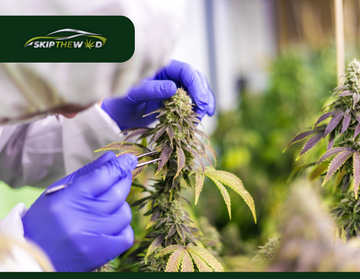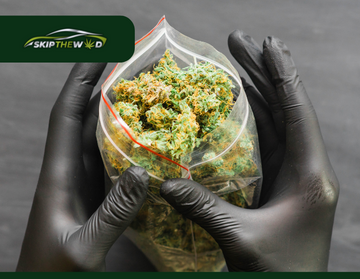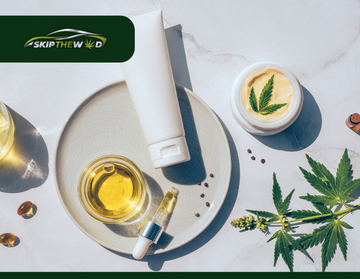In recent years, CBD (cannabidiol) has emerged as a wellness powerhouse, gaining popularity for its potential therapeutic benefits. However, with the rise in demand for CBD products, a myriad of myths and misconceptions has also proliferated. In this blog, we will debunk common CBD myths, providing clarity and separating fact from fiction about weed's CBD oils.
Myth 1: CBD Gets You High Like THC
One of the most persistent misconceptions about CBD is that it induces a euphoric high similar to THC (tetrahydrocannabinol), the psychoactive compound found in marijuana. In reality, CBD is non-psychoactive, meaning it does not produce the characteristic "high" associated with THC. CBD interacts with different receptors in the body, primarily the endocannabinoid system, influencing factors like pain perception, mood, and sleep without altering consciousness.
Myth 2: All CBD Products Are the Same
Not all CBD products are created equal. The market is flooded with various formulations, including full-spectrum, broad-spectrum, and CBD isolates. Full-spectrum CBD contains a range of cannabinoids, including trace amounts of THC, while broad-spectrum contains other cannabinoids minus THC. CBD isolates, on the other hand, are pure CBD without any additional compounds. Understanding these distinctions is crucial for choosing a product that aligns with your preferences and needs.
Myth 3: CBD Is Only Derived from Marijuana
While marijuana is a source of CBD, it's essential to recognize that CBD can also be extracted from industrial hemp. Hemp-derived CBD is legal in many places, as it contains minimal THC levels. With the passage of the 2018 Farm Bill in the United States, hemp-derived CBD has become more accessible, offering consumers a legal and non-intoxicating alternative.
Myth 4: CBD Works Instantaneously
CBD is not a magic potion that provides instant results. The effects of CBD can vary depending on factors such as the delivery method, dosage, and individual response. While some people may experience immediate relief, others may require more time. Patience is key when incorporating CBD into your routine, and consistent use is often necessary to observe its full potential.
Myth 5: Higher Doses of CBD Are Always Better
The notion that higher doses of CBD equate to better results is a common misconception. In reality, the optimal dosage varies among individuals, and more is not always better. Starting with a lower dose and gradually increasing allows you to gauge your body's response. Additionally, some conditions may respond better to lower doses, emphasizing the importance of personalized dosing for maximum efficacy.
Myth 6: CBD Doesn't Interact with Medications
CBD has the potential to interact with certain medications. It's crucial to consult with a healthcare professional before incorporating CBD into your routine, especially if you are taking medications. CBD can affect the metabolism of drugs in the liver, potentially altering their effectiveness or causing adverse reactions. Open communication with your healthcare provider ensures a safe and informed approach to integrating CBD into your wellness plan.
Myth 7: CBD Is a Cure-All Miracle Substance
While CBD shows promise in addressing various health concerns, it's not a cure-all. CBD should be viewed as a complementary tool in promoting wellness, not a substitute for medical treatments. Scientific research on CBD is ongoing, and while there is evidence supporting its efficacy for certain conditions, it's essential to approach CBD with realistic expectations and in conjunction with a holistic approach to health.
Myth 8: CBD Is Addictive
CBD is not addictive. Unlike THC, which can lead to dependency in some individuals, CBD does not produce the same addictive properties. In fact, CBD has shown potential in helping individuals overcome substance addiction by influencing the endocannabinoid system, which plays a role in regulating reward pathways in the brain.
Myth 9: CBD Is Only for Adults
CBD has shown promise for various age groups, including children. Epidiolex, a CBD-based medication, is FDA-approved for the treatment of certain types of seizures in children. However, it's crucial to consult with a pediatrician or healthcare professional before administering CBD to children. Dosages and formulations may need to be adjusted based on individual needs and health conditions.
Myth 10: CBD Doesn't Have Side Effects
While CBD is generally well-tolerated, it can have side effects in some individuals. Common side effects may include drowsiness, dry mouth, and changes in appetite. It's essential to be aware of potential interactions with medications and to start with a lower dose to minimize the risk of adverse effects. As with any supplement, consulting with a healthcare professional ensures a safe and tailored approach to CBD use.
Conclusion
By dispelling misconceptions surrounding CBD and weed's CBD oils, individuals can make educated decisions, embracing the potential therapeutic benefits while understanding the limitations. As the science behind CBD continues to progress, separating fact from fiction ensures a more accurate and nuanced perspective on this versatile compound. If you find this blog helpful, check out more of our recently published articles. Explore Skip The Weed Today!









